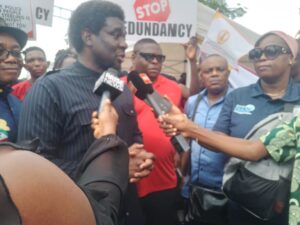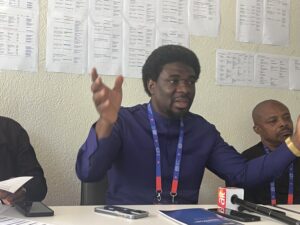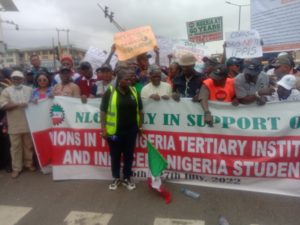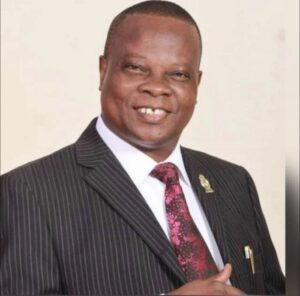Africa’s Poverty, Nigeria’s Democracy, and the Future of Workers” – Cm Peters Adeyemi
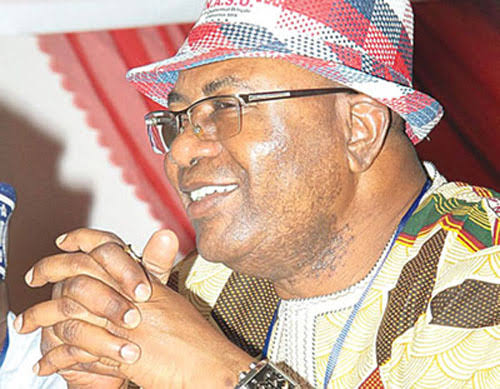
An Exclusive Interview with the President of PSI Africa, Cm Peters Adeyemi
Introduction
In this wide-ranging conversation, the President of Public Services International (PSI) Africa reflects on the continent’s economic struggles, the rising poverty rates linked to international financial institutions, and the challenges facing workers in Nigeria and beyond. Speaking candidly, he critiques governance in Africa, debt dependency, the devaluation of currencies, and the failure of governments to uphold promises to workers. He also shares his views on Nigeria’s Democracy Day, the controversial minimum wage, and the role of trade unions in securing a better future.
Poverty, War, and Global Institutions
The problem in Africa today is predominantly poverty. We have also seen governments dictated to by global institutions like the IMF and the World Bank, and that has contributed heavily to the worsening poverty across the continent.
Currencies are being devalued to the point where they virtually have no value. This leads to indecent work, violations of trade union rights, and worsening living conditions. The trade unions are trying their best — PSI is trying its best — but the problem is deeply rooted and complex.
To address this, there must be stronger collaboration between Global Unions and the African Union to push for more trustworthy and accountable governments. Unfortunately, many governments in Africa campaign on promises but abandon them once in power.
Countries Most Affected
Kenya and Nigeria stand out. The Kenyan shilling has collapsed, much like the Nigerian naira. Both countries have become heavily tied to IMF and World Bank dictates. They are almost like twin brothers when it comes to this dependency — and the result is worsening poverty across both nations.
On Debt and Borrowing
The government often says there’s nothing wrong with borrowing, but I disagree. Excessive borrowing is dangerous because the debts cannot be repaid by the current government and will burden future generations.
Worse still, much of the borrowed money is not invested productively. It is wasted, mismanaged, or even used for political campaigns instead of infrastructure or services. Borrowing to pay salaries or service loans is not sustainable. Countries should generate resources internally and close loopholes, rather than relying on endless loans that create more crises.
Nigeria’s Democracy Day
The Democracy Day should celebrate the dividends of democracy, but for Nigerian workers, there is nothing to celebrate. In fact, workers have been set back 10 years under this government.
The removal of fuel subsidy and the unification of exchange rates are being celebrated by the government, but in reality, they have impoverished workers. State governments have become richer, while workers — who produce the wealth — are left poorer.
For politicians, Democracy Day is worth celebrating because of the personal wealth they’ve accumulated. But for the average Nigerian worker, there is no cause for celebration.
Private Sector and Multiple Taxes
When government is desperate to generate revenue, it imposes excessive taxes without considering the consequences for businesses or workers. Import duties, for example, make even fairly priced vehicles from Europe unaffordable once they reach Nigeria.
These policies do not support the people — they only make life harder. Unfortunately, the so-called “wise men” advising the president on economic policy are mostly from the private sector. Ironically, these same individuals may be behind the very policies that are hurting small businesses and ordinary citizens.
Minimum Wage implementation
The process that led to the ₦70,000 minimum wage was flawed. It was not the outcome of collective bargaining through the traditional tripartite process. Instead, it was determined by the presidency.
Labour leaders even stood beside the president, singing solidarity songs when it was announced. But in reality, ₦70,000 is not a living wage — it amounts to just about $44 per month. It cannot even buy a bag of rice.
This shows a lack of sensitivity from both government and employers. It is unsustainable, unjustifiable, and a joke. We need to start negotiating a realistic minimum wage immediately.
Social Welfare and Labour’s Role
The Nigerian government has not shown serious commitment to welfare packages or social protection. While Nigeria has signed many ILO conventions, implementation remains weak.
Even the minimum wage is not enforced across all states. Social welfare is mostly left to individual employers rather than government policy. Pension reform is one of the few areas where we have seen some progress, but much more is needed.
Labour unions must also be cautious about their involvement in politics. If unions are seen as pursuing political ambitions rather than workers’ welfare, governments will simply dismiss them. We must strike a balance — engaging government constructively while maintaining independence and credibility.
Conclusion
The PSI Africa President stresses that Africa’s crisis of poverty, debt, and weak governance will not be solved by borrowing or by blindly following global financial institutions. Instead, he calls for accountable governments, stronger labour movements, and genuine social protection systems. For Nigerian workers, he warns, the fight is far from over — and only sustained pressure and strategic unity can bring meaningful change.
